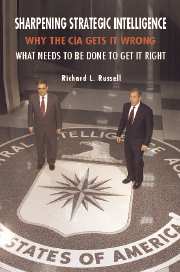 Sharpening Strategic Intelligence
Sharpening Strategic Intelligence Book contents
- Frontmatter
- Contents
- Acknowledgments
- Sharpening Strategic Intelligence
- 1 Strategic Intelligence and American Statecraft
- 2 Debunking Cold War Myths
- 3 Stumbling after the Cold War
- 4 Blundering in the “War on Terrorism”
- 5 Spies Who Do Not Deliver
- 6 Analysts Who Are Not Experts
- 7 Facing Future Strategic Intelligence Challenges
- Notes
- Selected bibliography
- Index
1 - Strategic Intelligence and American Statecraft
Published online by Cambridge University Press: 26 July 2009
- Frontmatter
- Contents
- Acknowledgments
- Sharpening Strategic Intelligence
- 1 Strategic Intelligence and American Statecraft
- 2 Debunking Cold War Myths
- 3 Stumbling after the Cold War
- 4 Blundering in the “War on Terrorism”
- 5 Spies Who Do Not Deliver
- 6 Analysts Who Are Not Experts
- 7 Facing Future Strategic Intelligence Challenges
- Notes
- Selected bibliography
- Index
Summary
The u. s. intelligence community suffered from two of the greatest intelligence debacles in its sixty-year history with the 11 September 2001 (“9/11”) al-Qaeda attacks and the assessment of Iraq's weapons of mass destruction (WMD) programs in the run-up to the war launched in 2003 against Saddam Hussein's regime. Although the intelligence community is made up of some sixteen intelligence agencies with varying responsibilities and functions, the lion's share of the burden of these failures falls squarely on the shoulders of the Central Intelligence Agency (CIA), which had been the lead agency for providing strategic intelligence to the president in his role as commander in chief.
Taxpayers now pay about $44 billion per year on intelligence to support the president of the United States in defending U. S. interests. This is a steep increase from the 1998 intelligence community budget of some $27 billion. The U. S. intelligence community budget, moreover, is a sum that dwarfs the entire defense expenditures of most countries. All of the sixteen intelligence organizations that comprise the intelligence community have about 100,000 people working for them. Although the CIA consumes only a small portion of the total intelligence community budget, it still has a workforce of some 17,000 people, by the account of former Director of Central Intelligence (DCI) George Tenet.
Yet that large annual investment and sizable manpower did not spare the United States its two most devastating intelligence failures since the inception of the U. S. intelligence community in 1947.
- Type
- Chapter
- Information
- Sharpening Strategic IntelligenceWhy the CIA Gets It Wrong and What Needs to Be Done to Get It Right, pp. 1 - 28Publisher: Cambridge University PressPrint publication year: 2007


